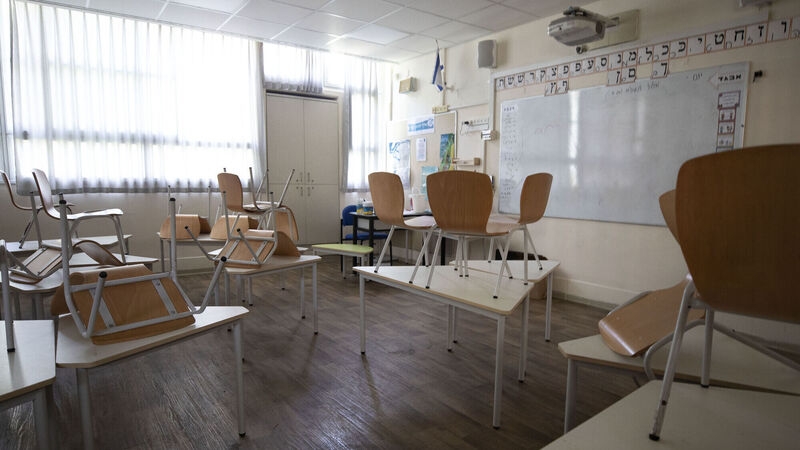Secret Diary of an Irish Teacher: Remember when you were a teenager?

Pic: Sebastian Scheiner
I’m glad my kids aren’t teenagers yet. It’s tough being a teenager and a lot of the time, I’m not sure they get a fair enough deal. I need time to prepare myself for it.
Do you remember being one yourself? I certainly do. I sported ripped denim hotpants, inadvisably short of course, with opaque tights beneath - Madonna style. I smoked Silk Cut Blue behind parked vans, loitered around shopping centres, and thought about boys. I was a textbook teenager, bumping along the road to adulthood with the grace and knowledge of a bollard.
That’s what being a teenager is, for most of us.
But on a more serious note, it’s also a specific stage of development. And its not one we’re that comfortable with. Let’s say you have a toddler over to visit, do you chastise them for whacking their head on your table? Do you demand that they develop better coordination? Might you criticise an elderly person for meandering too slowly down the shopping aisle? No. These stages of development we’re comfortable with.
Psychologists inform us that teenagers are programmed to take risks. It’s what they’re supposed to do. It’s our job to minimise the impact of those risks – much like baby-proofing a kitchen.
And my God, teenagers can be as demanding as toddlers! They look at you sometimes like they want to eat you, or more often like you’re not quite good enough to eat. Their tone jolts from respectful to murderous within seconds and they hold grudges like they hold the steel bar of a roller coaster. I’m not saying teenagers aren’t tough to deal with, just that we need to deal with them.
Do we? We’ve no infrastructure for them outside organised sports. They have a few places they feel invited to be. We don’t like seeing them gathering outside. Where else can they go? Far too often we avoid and ignore the reality of people between the ages of 14 and 19, once the Furby turns Gremlin, we’d rather close our door, cross over to the other side of the street.
Oh, but we’re missing out on a great bunch of people!
The other day my husband and I took a trip to Kinsale. I wanted to find a bookshop quickly. I approached a teenager in a tracksuit, chewing gum on his bike. When I asked him for directions, you should have seen his little face. Honestly, it lit up. It beamed. My husband noticed it too and laughed at me and my penchant for grumpy looking teens.
Generally, how do we look at teenagers when we see them in their groups, contemplating their little risks, outside our shops and houses. How often do we smile at them? How often do we ask them how they’re doing? How often do we ask them to help us? I see people smiling at each other all the time. I just don’t see them smiling at teenagers that much.
I think it impacts them. Teenagers can look excessively glum and antagonistic but that’s the stage they’re at. They’re meant to look that way. A lot of them anyway. They’re busy questioning everything and we need them to do that, so they can find their way. At one stage of my own adolescence, I sported a gold dollar medallion, teamed with a Mexican poncho, raver jeans and black clogs. I was a walking cry for help. I just had to come out the other side.
When you smile at a teenager or ask them for help, they will generally respond well. They like being part of things. They like to feel seen and respected. I promise you. There are exceptions to the rule, but I know from school just how amazing young people can be. Like Holden Caufield in Catcher in the Rye, they might see us as phonies. But we need to ignore that. We’re the grown-ups.
Students have embraced the challenges of returning to school so bravely. I am so proud of mine. It helps that my school prizes good relationships over everything. Teenagers crave visibility; we need to see them.
There’s a lot of anger directed at young people for having parties despite Covid restrictions. Of course, such behaviour is wrong, but why might they be misbehaving? Is it because we’ve forgotten them a little? These are natural risk-takers and we are meant to be their supports. Where are their parents? Where are their civic values? What have we not taught them? And what about all the teenagers and young adults not misbehaving? Where is their representation in the media?
My son will be a teenager in three years. I hope people smile at him in the street and make him feel welcome, even if he is hanging around with his friends, hood up and attitude out. I hope I’ve given him enough support to ensure he takes risks as safely as possible, causing no harm to anyone else. That’s on me though. Until he’s an adult, it’s all his parents.
His little brain is still forming and won’t be finished until he’s around twenty-five years old. When we look at him now, mostly, we need to smile. He’s taking it all in and he will return it in time. And the joy of that return will outweigh the growing pains of his teenage years. It’s an investment we need to make together.





